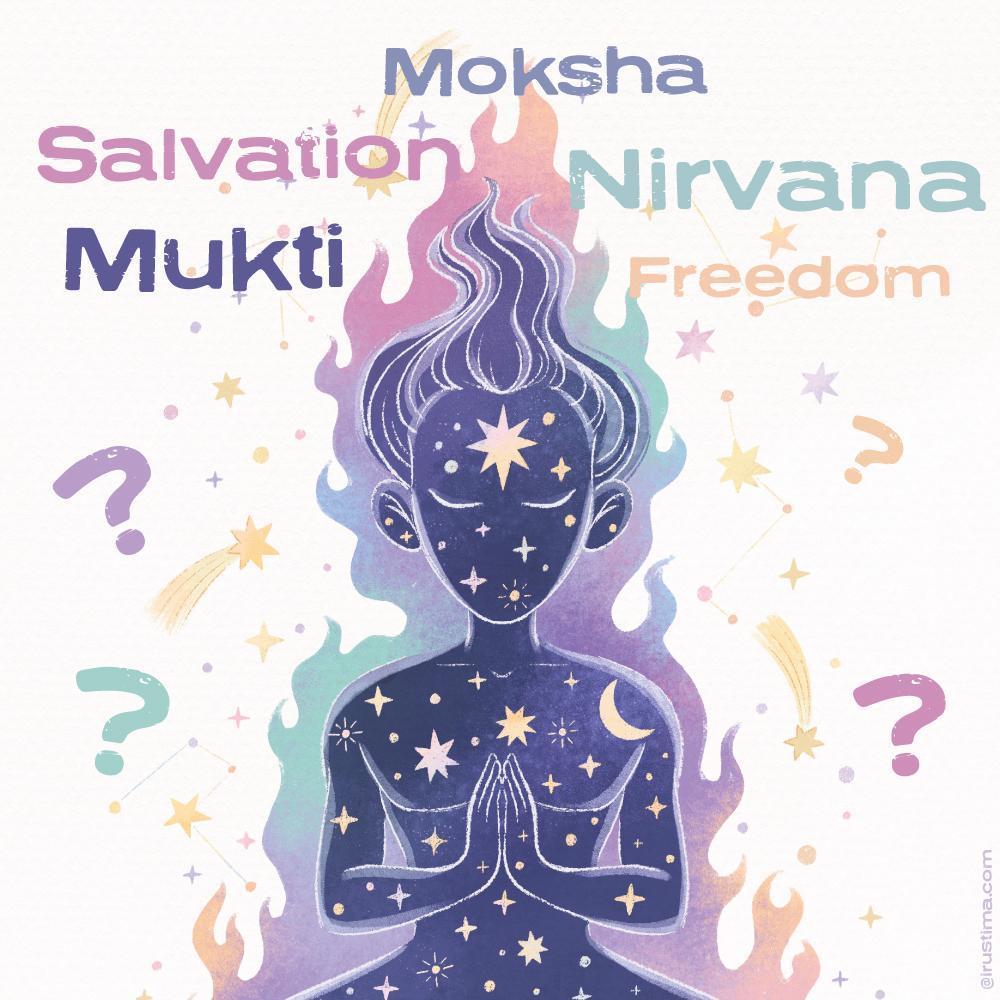
01 Dec Mukti, Moksha, Nirvana, Salvation, Freedom
While breaking down E=MC2 with a buddy, beer in hand, we both figured our handle on Einstein’s equation was enough to finally wrap up our endless banter. Despite my reservations about his understanding of E=MC2, I gave in to the fragrant odours wafting from the dinner table, which were acting as a siren’s call to my growling stomach.
As we walked towards the dining table, my friend jested, “Grasping E=MC2 is like achieving Nirvana!”
“‘Moksha’ might be a better fit than ‘Nirvana,'” I teased, flashing a grin at him.
He paused, eyeing me suspiciously.
I held my grin steady.
My friend has an imposing physical presence, and occasional that can be intimidating. At that moment, I half-expected a fist flying my way to give me ‘Mukti’ from this cycle of life.
“What’s the difference? Nirvana and Moksha are synonyms,” he restrained himself from launching the punch, reserving it perhaps for another time.
“No, they’re not,” I replied courteously, cautiously avoiding further provocation.
He gave me a sterner look, stating, “They’re the same thing, and dare you ruin my meal today with more discussions!”
“Fine, I won’t, but Mukti, Moksha, Nirvana, Salvation, and Freedom aren’t simply interchangeable,” I countered in an attempt to uphold my honour, and risked baring myself to his imposing physicality.
At that instant, he raised his hefty right hand, formed a tight fist, and tapped his head thrice in frustration. That was as far as I could dare to test his patience. Any further prodding would have granted me a premature ‘Mukti’ from the delectable feast laid out before us.
The next morning, I penned this blog and shared the link with him. Another round of endless banter might be on the horizon for the upcoming weekend.
The intricate complexities of spiritual ideologies and philosophical concepts often interlace words like Mukti, Moksha, Nirvana, Salvation, and Freedom, blurring the fine lines that separate their profound meanings. Approximations in meaning caused by limitations of foreign language, culture, beliefs and interpretations make these concepts further misconstrued, or overly simplified. Mukti, Moksha, Nirvana, Salvation, Freedom, though seemingly synonymous, encapsulate distinct nuances and philosophies, contributing to the richness of human thought and understanding.
Mukti
Mukti, deeply rooted in Hindu philosophy, epitomizes liberation or release from the perpetual cycle of birth, death, and rebirth—samsara. It signifies the soul’s transcendence beyond worldly existence, shedding the constraints of karma and desires. Mukti, in its essence, is the freedom of the soul from the eternal cycle, enabling it to reunite with the divine or attain its purest form of being the ‘brahmand’ (the great singularity).
Moksha
Moksha holds a nuanced distinction within Hinduism. Moksha emphasizes the transcendence of individual identity to merge with the ultimate reality or cosmic consciousness. It delves into the concept of self-realization, breaking free from the rigmaroles of life and realizing the true nature of the self by attaining unity with the forces we may call divine due to lack of absolute understanding of what’s out there that is running the show here.
The nuanced difference between Mukti and Moksha lies in their emphasis—Mukti leans toward liberation from the cycle of rebirth, while Moksha emphasizes the realization of the true self and unity with the divine reality, transcending individual identity.
Nirvana
In the realm of Buddhism, Nirvana embodies the pinnacle of spiritual attainment. It signifies the extinguishing of desires, attachments, and ignorance, leading to the profound realization of ultimate truth and inner peace. Nirvana liberates one by eradicating cravings, and by ending desires, which ultimately helps to achieve a state of perfect tranquility and wisdom… aka Nirvana.
Salvation
Moving into the domain of Christianity, Salvation represents deliverance from sin’s grip and its dire consequences. It revolves around the redemptive act of God through Jesus Christ, offering eternal life and reconciliation with the divine. Salvation involves faith, repentance, and grace, leading believers to communion with God and eternal bliss.
Freedom
A broader and multifaceted concept, freedom transcends spiritual boundaries and extends across various dimensions of human existence day-to-day. It encompasses political, personal, social, and spiritual liberation, signifying the ability to act without restraint, exercise free will, and pursue autonomy in diverse spheres of life.
In dissecting the nuanced differences between Mukti, Moksha, Nirvana, Salvation, and Freedom, it becomes evident that while these concepts converge in their pursuit of liberation, each embodies different meanings, unique paths, philosophical frameworks, and cultural contexts. Understanding these subtleties enriches our comprehension of the diverse philosophical landscapes and spiritual aspirations across cultures, underscoring the profundity and richness of human thought from across countries and ages in its quest for ultimate liberation and transcendence for being better humans,in this birth and across lifetimes.
If you liked this post, then you may consider reading The Role of “Maya” in Negotiation, Elements of a Fulfiling Life, and Creating A Personal ‘Learning Ecosystem’ also.



No Comments